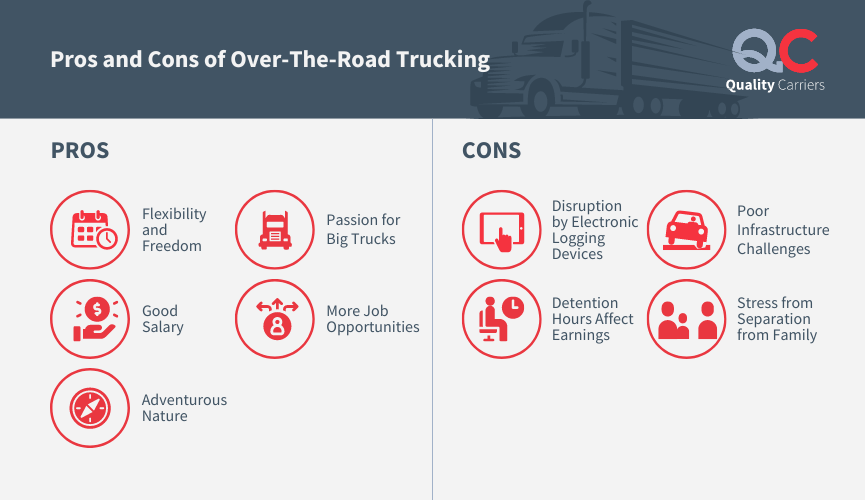With over 70% of freight tonnage transported across the United States reliant on trucking, the role of over the road trucking (OTR) in sustaining the nation’s economy cannot be overstated. As the backbone of logistics, OTR trucking ensures the seamless flow of goods from coast to coast, connecting producers with consumers and businesses with markets. Yet, behind the staggering statistics lies a world of complexity and opportunity, beckoning aspiring truckers to embark on a journey along the expansive highways of commerce.
In this exploration of over the road trucking, we will discuss the landscape, requirements, and nuances defining this essential OTR Trucking sector.
What is Over-the-Road Trucking?
Over the road trucking (OTR) refers to transporting goods over long distances, typically between states or regions. OTR truck drivers cover extensive distances, often traveling across highways and interstates to deliver freight to various destinations. Unlike local or regional trucking, which involves shorter routes within specific areas, OTR trucking requires drivers to spend extended periods away from home, sometimes for several days or weeks. OTR drivers operate heavy-duty trucks, commonly known as semis or tractor-trailers, and play a crucial role in the supply chain. They ensure the efficient delivery of goods over vast geographic areas.
OTR Trucking Job Requirements
The Federal Motor Carrier Safety Administration mandates holding a commercial driver’s license (CDL) to operate an over-the-road truck. The process begins with obtaining a Commercial Learner’s Permit (CLP), which allows practice driving on public roads. After a 14-day CLP period, applicants undergo a three-part skills test. During the practical exam, drivers provide their trucks, which are subject to inspection—completing the exam results in obtaining a CDL and launching a career in over the road trucking.
Additional certifications may be pursued based on job requirements, such as obtaining a CDL HAZMAT endorsement for transporting hazardous materials or upgrading to Class B or C licenses for specific vehicle types. While Class A licenses are standard for OTR drivers, other classifications cater to specialized vehicles like delivery trucks or tanks.

Pros and Cons of Over-the-Road Trucking
Over the road trucking offers competitive salaries, travel opportunities, and a sense of independence. However, it also entails long hours on the road, extensive time away from home, and potential health and safety risks.
Pros:
- Flexibility and Freedom: Over the road trucking allows drivers to travel across different states and regions, providing flexibility in their work schedules.
- Good Salary: OTR truck drivers often earn competitive salaries due to the long-haul nature of their jobs and the high demand for their services.
- Adventurous Nature: Over the road trucking can be an adventurous experience, allowing drivers to explore new places and see different parts of the country while on the road.
- Passion for Big Trucks: Many OTR truck drivers have a genuine passion for big trucks and enjoy the experience of driving them over long distances, making the job more fulfilling for them.
- More Job Opportunities: Over the road trucking offers various range of job opportunities, with many companies actively seeking drivers for long-haul routes, providing drivers with more options for employment.
Cons:
- Disruption by Electronic Logging Devices (ELDs): Implementing electronic logging devices can disrupt driver schedules and add pressure to meet strict regulatory requirements, leading to potential challenges in managing driving hours effectively.
- Detention Hours Affect Earnings: Time spent waiting at loading docks or in “detention” can significantly reduce a driver’s earning potential by eating into valuable driving time without compensation, impacting overall income.
- Poor Infrastructure Challenges: Navigating through areas with inadequate road conditions or infrastructure can pose delays, detours, and increased wear and tear on vehicles, affecting efficiency and overall job satisfaction.
- Stress from Separation from Family: Extended periods away from your family can lead to emotional strain and stress for truck drivers. This impacts mental well-being and overall job satisfaction. The feeling of isolation and missing important family events can contribute to loneliness and discontentment on the road.
Difference Between OTR, Regional, and Local
While OTR trucking involves long-distance hauls, regional and local trucking focuses on shorter routes within specific geographic areas. Each type of trucking offers advantages and challenges, catering to different preferences and lifestyles.
| Aspect | Over-the-Road (OTR) | Regional | Local |
| Distance | Long distances, nationwide | Mid-range, within a region | Short distances, local area |
| Routes | Typically interstate highways | Mix of highways and local roads | Mostly local roads and streets |
| Time Away | Extended periods, weeks | Shorter, usually home weekly | Daily, home nightly |
| Delivery Time | Longer delivery times | Faster deliveries | Quick deliveries |
| Schedule | Irregular, variable | More consistent | Predictable |
| Freight Types | Diverse, includes various cargo | Varied, depending on region | Local goods, less variety |
| Pay Structure | Typically higher due to longer trips | Mid-range, balancing distance and time | May vary, often hourly or per trip |
| Equipment | Standard tractor-trailer rigs | Often specialized for regional needs | Standard and smaller trucks |
Start Your OTR Trucking Career at Quality Carriers
Starting your over the road trucking career at Quality Carriers presents an exceptional opportunity for aspiring truck drivers. With a reputation for safety, reliability, and employee satisfaction, Quality Carriers offer comprehensive training programs tailored to OTR requirements, ensuring that new and transitioning drivers are well-prepared for success on the road.
Additionally, drivers at Quality Carriers operate modern and well-maintained equipment, providing both safety and comfort during their journeys. Competitive pay rates, attractive benefits packages, and opportunities for career growth further enhance the appeal of joining the Quality Carriers team. Moreover, the company’s steadfast commitment to safety, supportive work environment, and dedication to promoting from within contribute to a fulfilling and rewarding driver experience. Start your OTR trucking career with Quality Carriers and enjoy a fulfilling journey in the transportation industry.
In conclusion, over the road trucking represents a rewarding career path for individuals passionate about transportation and adventure. By understanding the job requirements, salary expectations, and lifestyle considerations, aspiring OTR truck drivers can make informed decisions about their future in the industry.
Over-the-Road Trucking FAQs
Is OTR trucking a good career choice?
Over the road trucking can be a rewarding career choice for individuals who enjoy long-distance driving and the freedom of the open road. It offers opportunities for travel, independence, and competitive pay. However, it requires a significant time commitment away from home and can involve long hours of driving. Whether OTR trucking is a good career choice depends on individual preferences, lifestyle goals, and willingness to meet the job demands.
How much is the salary for an over-the-road truck driver?
The salary for an over-the-road truck driver varies depending on factors such as experience, company, location, and type of freight hauled. On average, OTR truck drivers earn between $50,000 to $80,000 per year.
Which is better, OTR or local trucking, regarding lifestyle and earnings?
The choice between OTR and local trucking depends on individual preferences, lifestyle considerations, and career goals. OTR trucking offers the opportunity for long-distance travel and potentially higher earnings due to longer routes and mileage pay. On the other hand, local trucking typically involves shorter routes, predictable schedules, and more time spent at home each night. While local trucking may offer a better work-life balance for some drivers, it may come with lower earning potential compared to OTR driving.









